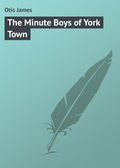
Otis James
A Runaway Brig: or, An Accidental Cruise
CHAPTER XXVI.
BOLD THIEVES
The old sailor remained on duty until the day began to break. The loss of the yawl troubled him more than he cared to say, and this, together with the possibility that she might have been taken during his watch, drove all desire for sleep from his eyes.
When the yellow shafts of light shot up from the eastern sky to herald the approach of dawn he awakened his companions, and while the boys went into the galley to commence the labors of the day, he and Joe stood on the forward-bitt, eagerly scanning the surrounding shore for some signs of the boat.
In this they were not to be disappointed, for as the shadows retreated the yawl stood revealed on the beach at the point where the Sea Bird's crew emerged from the thicket when staggering under the weight of the pirates' gold, and standing near, as if examining their stolen prize, were the three men.
"There's one good thing about it," Bob said grimly. "By losin' our boat we shall get rid of Mr. Red-nose and his friends, an' I ain't sure but we'll be sellin' 'em reasonably cheap."
Joe was so enraged by the sight that he could make no reply, and the old sailor continued half to himself:
"It won't be sich a terrible job, after they've gone, to build a raft that'll carry us ashore, an' p'rhaps the outcome of it'll be our savin' the steamer."
The watchers had not long to wait before it became apparent that the party on shore did not intend to delay their departure.
All three busied themselves with bringing bundles and boxes from the thicket after the survey of the boat was ended, and in less than half an hour the little craft had a full load.
A light breeze came from the west, and after stepping on board it was only necessary to row the yawl a short distance from the shore when the sail filled, causing her to glide slowly toward the open sea.
Bob and Joe watched these maneuvers in silence without heeding Jim's announcement that breakfast was ready, and much to the astonishment of both, the sail was brailed up when the boat reached a point nearly opposite the steamer.
"I'll be blowed if they haven't got the nerve to speak us!" the old sailor exclaimed; and almost at the same moment the red-nosed man shouted, as he raised his hat in mock politeness:
"We're sorry to leave you here aground, and without a tender; but you didn't feel like makin' any friendly talk to us yesterday mornin', so we had to help ourselves. I had an idee we'd get the best end of the trade if it come to bein' disagreeable!"
"Don't worry about us!" Bob shouted angrily. "We're glad to get rid of you at any price; but my advice is that you give Nassau a pretty wide berth!"
"We should be ungrateful if we did not heed the counsel of those who have rigged the boat for us in such a satisfactory manner!" the Mexican replied with a laugh; and then the sheet was hauled aft once more and the little craft laid on such a course as would bring her close past the southerly point of the harbor.
Bob and Joe remained silent and motionless until the thieves were shut out from view by the land, and then the former said, with an attempt to speak cheerfully:
"That ends 'em, so far as we are concerned, an' its best not to think of the scoundrels ag'in. We've either got to take up our quarters on the island or rig some plan for floatin' the steamer, an' I reckon that'll occupy pretty much all our time. Let's get breakfast, an' then decide what's to be done."
There was no necessity for spending many moments on deliberations when the morning meal had been eaten, for whatever might be done, the first step was to establish communication with the shore, and this Joe proposed to do when he came on deck again.
The thieving crew were nowhere in sight, as would have been the case had they sailed in almost any other than a southerly direction, and it seemed probable that the yawl had been headed toward Nassau despite the danger the men would incur of being arrested.
"I only hope they'll fool around in the vicinity until that schooner comes back and captures every one!" Joe said in anything rather than a friendly tone, after taking a deliberate survey of such portion of the ocean as could be seen from the tug; and then he added abruptly, as if determined to put all unpleasant thoughts far from his mind, "Now, what about getting on shore, Bob?"
"We must rig up some kind of a raft, I reckon, an' then stretch one of the heavin' lines so's she can be pulled back and forth without too much work."
"Jim, you and Harry overhaul the lines," Joe said as he began to undress; "and while Bob is building the raft I'll swim ashore."
"Don't do it!" the old sailor cried, warningly. "There are too many sharks around these keys to make swimmin' very safe sport!"
"We sha'n't be likely to find them in such shoal water. The boys can stay near the bow, and with all hands on the lookout I don't fancy there'll be much danger," Joe replied carelessly, as he knotted around his waist the line Jim brought.
Then without more ado he leaped overboard; and so shallow was the cove at this point that hardly a dozen strokes were necessary before his feet touched the bottom, and he waded ashore to where a mangrove grew near the edge of the bank.
Around this he fastened the rope, and then returned to the steamer, saying, as he stepped on board:
"The Sea Bird crawled pretty well up on the shoal before the anchor caught."
"Yes," Bob replied sadly; "she's got so much sand under her nose that I'm afraid she'll stay here, unless – which ain't at all likely – some steamer puts in. I was reckonin' on usin' timbers from the bulk-head for a raft; but seein's how there ain't much trouble in gettin' ashore it'll be best for the boys to make one out of tree-trunks while you keep to work on the engine."
"Are you countin' on livin' ashore?" Jim asked, anxiously.
"We may be glad to, lad, if another gale springs up. We'll be ready to abandon the little steamer if the worst comes; but all hands are to work tryin' to float her jes' the same as if we believed it could be done."
The boys were not loath to be on the land once more. They undressed with alacrity, after bringing from below the axes and hatchets, and with their clothes packed in an empty cask from out of which one of the heads had been taken, they leaped overboard like a party of frogs.
"Cut about twenty medium-sized trees, and drag them to the beach after trimming off the branches!" Joe shouted as they landed.
The boys dressed quickly, for the swarms of mosquitoes rendered clothes very necessary, and at once set about the task of chopping, selecting such mangroves and palms as grew nearest the shore, in order to avoid, so far as possible, the labor of hauling them through the thick underbrush.
Then Bob and Joe began their portion of the labor. Although the old sailor believed the tug to be immovably fixed upon the sand, he did not propose to neglect anything which would tend to extricate her. Of course it was possible something might occur to better her condition; and in such an improbable event it was necessary she should be in working order. Besides, as he said to Joe, "it was as well to have a job on hand to occupy their attention as to idle the time away on the key."
By noon the boys had collected sufficient materials for the raft, and Bob swam ashore to assist in building it.
Using ropes and vines instead of nails, which were very precious just then, quite a serviceable raft was put together, and on it, by the aid of the rope Joe had stretched ashore, all hands pulled themselves out to the steamer.
The boys went into the galley to prepare dinner, and after it had been eaten the weary crew indulged in a long siesta, for the heat was almost overpowering.
There was no thought of standing watch, now their enemies had left the island, and everybody gave himself up to the desire for slumber which made his eyelids heavy. No one was sleeping very soundly, and Bob had only fallen into a doze, when a report as loud as would have been caused by the discharge of a musket rang out on the still air, causing boys and men to leap to their feet in alarm.
"What was it?" Joe asked, as he gazed around in bewilderment, but without seeing any living thing either on the sea or land.
"I'm blest if I know!" Bob replied, in a tone of perplexity. "It sounded close aboard; but how can – Say, is there anything below which could explode?"
"Not when there's no steam on."
The old sailor stood staring at the shore in silence, evidently seriously disturbed, and the three boys gathered around him in alarm. They had experienced so much which was both mysterious and terrible since the morning of the sail in the Sally Walker, that to them every unusual sound or movement meant further disaster, and Bob's palpable fear caused something very like horror to come upon them.
Joe had mechanically started forward, and before reaching the pilot-house he shouted, to the intense relief of all:
"We were more scared than hurt this time! It was only the heaving-line. It has parted, and in doing so made the noise; but I don't understand how there could be so much strain."
Bob glanced ashore quickly, assured himself that one end of the rope was still made fast to the tree, and then cried triumphantly as he pointed astern:
"There's where the strain came from! The sun has been dryin' the hawser till it pulled the tug back far enough to break the line! That shows how much can be done by tryin'! The Sea Bird is ready to come off the shoal if we help her a bit; so turn to, lads, an' work for all you're worth till she's in deep water once more!"
The slackened hawser, which a short time previous had been so taut, told that Bob's explanation was the correct one, and there was no necessity to urge either the boys or Joe any further. To have a chance of saving the little steamer after all had firmly believed she was helplessly stranded aroused every member of the crew as nothing else, save the actual arrival of friends, could have done.
CHAPTER XXVII.
THE CULMINATION OF DISASTERS
The first thing necessary was to ascertain exactly what portion of the steamer's hull was imbedded in the sand, and this Bob proceeded to do with the lead-line.
It was found that only about twenty feet of the keel rested on the shoal, the remainder overhanging four or five fathoms of water. The tide was at its highest point, which accounted for the movement of the steamer as the hawser shrank, and Bob cried in a cheery tone:
"I reckon it won't be impossible to launch the little craft, after all. By bringing the hawser on to the winch, shiftin' the ballast aft, an' heavin' down with every ounce of muscle we've got, somethin' oughter be done at the next tide."
Every one was ready to exert himself to the utmost, and in a very short space of time the heavy rope was brought to the winch, after which all hands tugged and strained at the bars until the cable had been hove taut again.
That done, there was an opportunity for rest. It would be useless to attempt anything more until the now receding waters should rise again, which would be the case twelve hours later, and the little crew gathered under the awning aft to discuss the new phase of affairs, while Joe continued his work on the metal; for this task, apparently so useless a few hours previous, had suddenly become very important.
"The question is, How long may we have to stop here after the tug's afloat?" Bob remarked as he lighted his pipe, and began once more to select from the timbers taken out of the cabin such as could be used on the shattered hull.
"By hard work it may be done in a week's time," Joe replied after some thought.
"Then you'll keep steady at it while me an' the boys 'tend to the other matters. You sha'n't be called to turn your hand on anything else till thas is done. Have we got coal enough for a three-hundred-mile run?"
Joe shook his head.
"I'm afraid not; but by taking on some wood we ought to be able to make it, for I suppose you're counting on going to Nassau?"
"That's the nearest port; an' we'll see to choppin' fuel when she's afloat, an' I've patched the bow a leetle more ship-shape."
During the remainder of the day, when they were not engaged in the galley, Joe had some trifling work which could be performed by the boys, and his every command was obeyed with alacrity, for all hands were eager to utilize each moment in preparing for departure.
That night a watch was kept, although there was nothing to be feared from their late enemies. Bob proposed to have some more exercise at the winch when the tide was at its full height again, and to that end it was necessary one of the party should remain awake to arouse the others at the proper time.
This work, however, had no other result than that of awakening the weary sleepers unnecessarily. Labor as they did to the utmost of their strength, the steamer was not moved so much as a single inch, and the old sailor said, after realizing the uselessness of the task:
"We'll have to shift everything aft, I reckon, before it's possible to pull her off this blessed sand. After sunset to-morrow we'll tackle the job, an' by the second tide have another turn at the winch."
Had the weary ones known just how fortunate they were in thus failing to pull the Sea Bird into deep water there would have been far less repining as they laid down once more on the mattresses under the awning.
The gray light of approaching dawn had but just begun to steal across the sky when Bob called all hands for another day's labor, and when the sun showed himself above the horizon each member of the crew was busily engaged.
Jim had positive orders to finish his task in the galley in the least possible time, because Joe wished to use the stove as a forge; and the breakfast was by no means elaborate, coffee being the only thing served hot.
"There isn't anything you boys can do on board this mornin', an' I reckon you'd better begin the job of cuttin' fuel to help out on the coal," Bob said when the rather unsatisfactory repast was brought to a close.
"How are we to get ashore?" Harry asked. "The raft went adrift when the heaving-line parted."
"She didn't go very far. Look off the port bow an' you'll see her on the beach. It won't be much of a job for Jim to run another rope out, an' he'll be all the better for a bath."
The young fisherman was not averse to what was little less than sport, and if he did spend considerably more time in the water than was absolutely necessary, no one could say any had really been wasted.
When the raft was in working order once more Harry and Walter clambered on board, and soon the shores of the harbor resounded with the blows of their axes. Owing to the scarcity of tools it was only possible for two to work at a time, consequently each had a certain number of minutes in which to rest.
It was after they had been on shore about two hours that Walter, during his idle moments, wandered out from the thicket to see if there had by chance been any change in the steamer's position, and he had not left his companions more than five minutes when they heard him shout:
"Come here, fellows, and see if you can tell what Joe is doing. It looks to me as if there was a big lot of smoke from the galley."
Not thinking it possible there could be anything wrong on the steamer, neither Jim nor Harry obeyed the summons very quickly, and when five minutes more had elapsed they were yet in the thicket.
"Harry! I'm sure there's some trouble aboard!" he shouted, and this time it was the tone rather than the words which caused them to move quickly.
On arriving where a view of the steamer could be had, Joe and Bob were seen working industriously under the awning; but a thick, black smoke was flowing out of the companion-way. The light breeze carried it shoreward; consequently the laborers, from whom it was hidden by the deck-house, were wholly ignorant of what seemed to Walter very alarming.
It did not require many seconds for Jim to make up his mind as to the cause of this unusual vapor, and his face grew pale as he cried sharply:
"The steamer is on fire! Hurry up an' get aboard!" Then as he ran at full speed along the shore he shouted loudly, "Bob! Bob! Fire! Fire!"
These cries were heard by the workmen before the boys gained the raft, and on glancing shoreward the tell-tale smoke was seen.
In an instant both men were forward, and, after stopping only the merest fraction of time to investigate matters, Bob began to draw up water with the deck-bucket, thus giving full confirmation to the fears of those on the raft, who were pulling desperately toward the steamer.
Both men were working with the utmost speed, dashing water into the companion-way, and causing the smoke to rise in yet denser volumes. Only once did either speak, and then when Bob shouted in a hoarse voice:
"Hurry on, lads; we'll need all hands at this job if the steamer is to be saved!"
This injunction was unnecessary, for the boys were making every effort to propel the raft at the swiftest possible rate of speed. The water boiled around the forward timbers as if a strong current was setting down toward them, and there was every danger that in their haste the frail craft would be forced asunder.
Long though the time occupied in the passage appeared to be when so much might depend upon an early arrival, it was really not more than five minutes from the time the boys left the shore until they were on deck searching for some article in which water could be carried.
With the exception of the two buckets used by Bob and Joe, everything of the kind was in the galley, and after a hurried, frantic search of the cabin and engine-room, the boys went forward empty-handed.
"There isn't so much as a dipper here!" Jim screamed.
"An' it's jes' as well," Bob replied hoarsely, as a volume of flame burst from the companion-way. "Nothin' less than a fire-engine would do any good now. It's time we saved what'll be needed ashore. Knock off, Joe, an' we'll load the raft."
The engineer was not willing to give up the struggle so easily. He worked like a fury, dashing water on the roaring, leaping flames, which were already sending out long streams on the tar-covered seams; and not until the fire had full possession of the forward portion did he cease his more than useless labors to assist the others.
Meanwhile Bob and the boys had been throwing bedding, tools, and every article within reach, on the raft. It was not until after they had been thus engaged several moments that any one thought of the treasure in the hold, and then Jim cried more frantically than before:
"The gold! The gold! We must get that out!"
"It'll have to take its chances with the rest!" Bob replied sharply. "Even if we could get below, the fire would be upon us before the bags were uncovered. Life is worth more than money jes' now."
Not until everything from the engine-room and cabin which could be of any service ashore had been piled up on the raft did Bob pause, and then the flames covered more than two-thirds of the deck. As a matter of course the heaving-line was long since burned from the winch, and nothing held the rude craft which now bore all their worldly possessions but the painter Harry had made fast to the stern-bitt.
"We shall have to swim for it, lads," Bob said as he shielded his face from the intense heat with his hat. "The raft is loaded so deep that the weight of one of us would swamp her."
As he spoke he seized Walter by the waist and leaped overboard, Jim waiting only long enough to ask Harry if he needed any assistance before following the example.
"Don't bother about me!" Harry replied; and then as the flames came nearer he plunged into the sea, Joe lingering a few seconds longer, as if to take one last look at the little craft he had tried so hard to save.
The wind carried the raft shoreward as soon as the painter was let go, therefore those in the water had nothing to care for save their own safety.
In less than ten minutes all hands were standing on the beach watching, with deepest sorrow written on every feature of their countenances, the destruction of the tug in which they had so fondly hoped soon to be steaming toward home.







